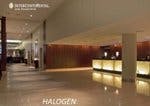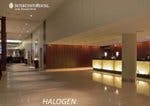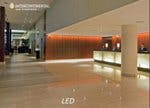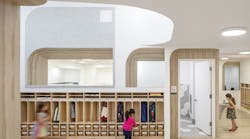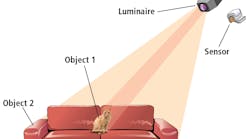The US Department of Energy (DOE) has just released the final report from a Gateway LED retrofit lamp installation in the San Francisco, California InterContinental Hotel. Solid-state lighting (SSL) installed in hotel common areas in place of existing halogen lamps delivered 70% energy savings and a 1.1-year payback after accounting for the halogen maintenance/relamping costs.
The hotel retrofit focused on luminaires that were in continuous operation in areas including the registration-desk area, the elevator lobbies, near conference rooms, and guest-room corridors. The project included wall-grazing luminaires, mono-point track lights, and recessed adjustable downlights.
Before the retrofit, the luminaires used a combination of 20W and 30W MR16, and 75W PAR30 halogen lights. Those lights were replaced with 6W MR16 and 11W PAR30 LED lamps from CRS Electronics. The retrofit lamps were chosen based on color quality, lumen output, candela distribution, beam appearance, color consistency, and flicker characteristics according to the DOE report. Moreover the chosen retrofit lamps had to be compatible with the existing transformers in the downlights and track heads.
The retrofit lamps do not deliver the same level of brightness as the halogen lights that were replaced according to the report. But in areas such as the registration desk the halogen lights were always dimmed and not operated at full brightness. The LED replacements are actually brighter than the halogen lights when compared to the way that the hotel facilities staff had operated the dimmable halogen lights. The report does note one negative in that the LED retrofit lamps aren’t dimmable and the hotel staff would prefer lower light levels in some areas at night.
The lights have been generally judged positively by the hotel staff. The report states, “User feedback indicated that the LED lamps delivered warm lighting that flattered interior finishes and skin tones, and duplicated the original lighting design intent without distracting glare or flicker.”
The retrofit project cost $19,396 for the lamps and the relamping labor. The report calculated the annual energy cost for the relamped area of the hotel to be $1,975. The calculated cost before the retrofit was $6,361. But the longer life of the LED lights significantly reduces maintenance relamping costs resulting in the 1.1-year payback reported by the DOE.
At the DOE report publication date, the LED lamps had operated for 3000 hours “without incident.” The test will continue and the DOE plans to remove a sample of the lamps at 3000 hour intervals for tests to document color and light output over time. That data will be added to the report as it becomes available.
Gateway is a DOE program that's administered by the Pacific Northwest National Laboratory. Earlier this year in a DOE webcast, Bruce Kinzey, Gateway demonstration program manager and senior research engineer at PNNL, said, "Gateway's purpose is to demonstrate new state of the art products in real world applications that meet the three criteria of saving energy, matching or improving illumination, and being cost effective for the user."
